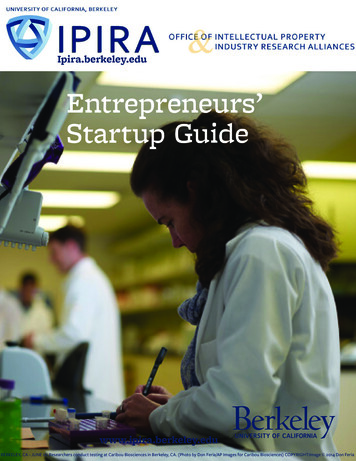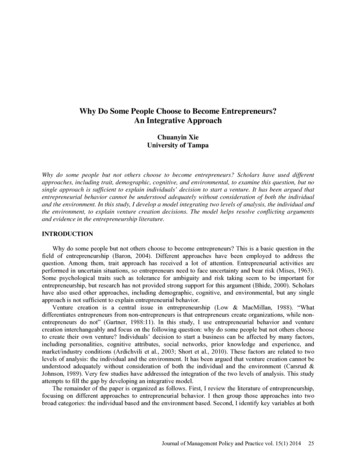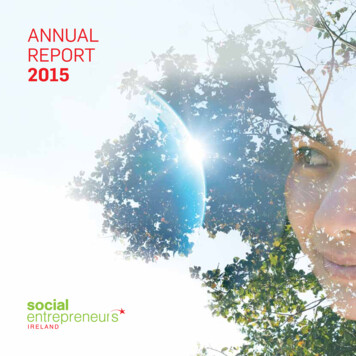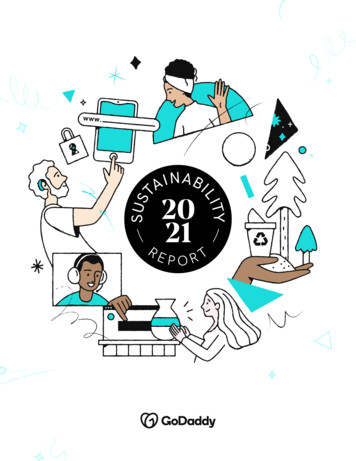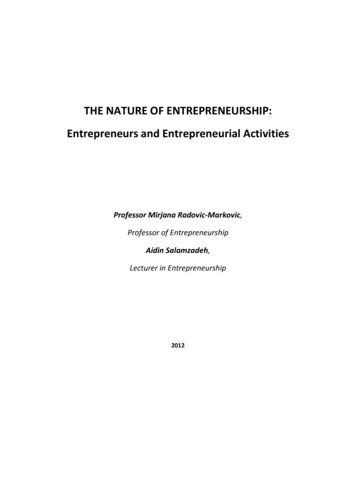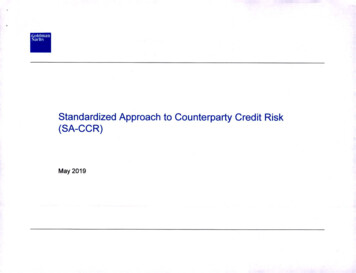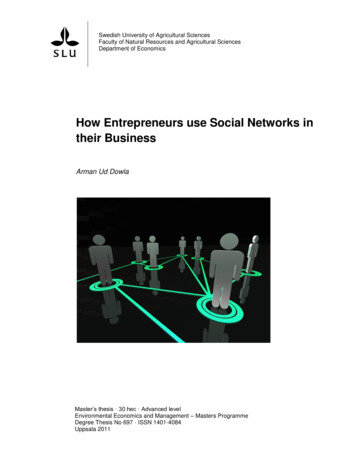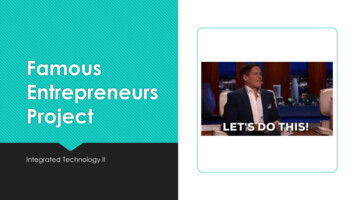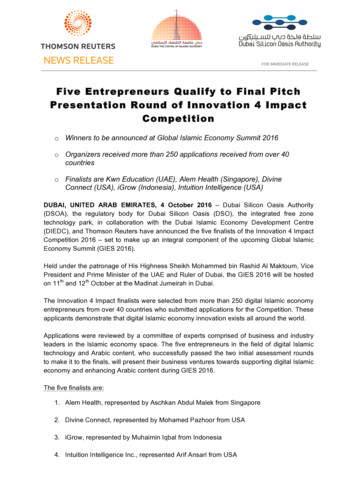
Transcription
Five Entrepreneurs Qualify to Final PitchPresentation Round of Innovation 4 ImpactCompetitiono Winners to be announced at Global Islamic Economy Summit 2016o Organizers received more than 250 applications received from over 40countrieso Finalists are Kwn Education (UAE), Alem Health (Singapore), DivineConnect (USA), iGrow (Indonesia), Intuition Intelligence (USA)DUBAI, UNITED ARAB EMIRATES, 4 October 2016 – Dubai Silicon Oasis Authority(DSOA), the regulatory body for Dubai Silicon Oasis (DSO), the integrated free zonetechnology park, in collaboration with the Dubai Islamic Economy Development Centre(DIEDC), and Thomson Reuters have announced the five finalists of the Innovation 4 ImpactCompetition 2016 – set to make up an integral component of the upcoming Global IslamicEconomy Summit (GIES 2016).Held under the patronage of His Highness Sheikh Mohammed bin Rashid Al Maktoum, VicePresident and Prime Minister of the UAE and Ruler of Dubai, the GIES 2016 will be hostedon 11th and 12th October at the Madinat Jumeirah in Dubai.The Innovation 4 Impact finalists were selected from more than 250 digital Islamic economyentrepreneurs from over 40 countries who submitted applications for the Competition. Theseapplicants demonstrate that digital Islamic economy innovation exists all around the world.Applications were reviewed by a committee of experts comprised of business and industryleaders in the Islamic economy space. The five entrepreneurs in the field of digital Islamictechnology and Arabic content, who successfully passed the two initial assessment roundsto make it to the finals, will present their business ventures towards supporting digital Islamiceconomy and enhancing Arabic content during GIES 2016.The five finalists are:1. Alem Health, represented by Aschkan Abdul Malek from Singapore2. Divine Connect, represented by Mohamed Pazhoor from USA3. iGrow, represented by Muhaimin Iqbal from Indonesia4. Intuition Intelligence Inc., represented Arif Ansari from USA
5. Kwn Education, represented by Hala AlTurki from UAEThe judging panel for this year consists of1. Dr. Adnan Chilwan, Group Chief Executive Officer at Dubai Islamic Bank;2. Ahmad Al Shugairi, Media Personality;3. Badr Buhannad, Vice President of Corporate Strategy and ICT at Dubai Silicon OasisAuthority; andThe finalists include entrepreneurs who are employing technology to provide solutions tosome of the world’s most difficult problems, innovators who are driving solutions to meet theever-increasing Muslim lifestyle needs and others who are creating new markets andexpanding into new industries.The Innovation 4 Impact Competition finalists demonstrate the remarkable potential to createbusiness ventures that convey positive opportunities and solutions to consumers,communities, and countries. Ideas for the pitch presentation will be judged on differentcriteria including: innovation, economic and social impact as well as the scalability acrossmarkets and regions. One lucky winner will receive a cash prize of US 20,000 and a set ofincubational services collectively valued at over US 10,000 - including the opportunity to setup office at the Dubai Technology Entrepreneur Centre (DTEC), DSOA’s wholly ownedtechnology incubation centre and the largest of its kind in the region.More than 2,500 delegates comprising of business leaders, corporate executives andinvestors have registered to attend GIES, representing some of the best examples ofentrepreneurial spirit and innovation across different industries and markets. GIES willprovide a unique opportunity for these industry players to connect with entrepreneurs anddiscover new market opportunities.Commenting on the list of finalists, Dr Mohammed Alzarooni, Vice Chairman and CEO ofDSOA, said: “We are proud to nurture the passion of these entrepreneurs who will contributeto the prosperity of the global Islamic digital economy space. We have witnessed a very highcalibre of submissions this year. The five entrepreneurs that have secured their places in thefinal round of the Innovation 4 Impact competition will showcase their digital solutions toinvestors and international influencers attending GIES 2016.”He added: “Our incubational ecosystem represented by DTEC will offer the winningentrepreneur a fertile ground for scalability and growth of his / her start-up as well as allnecessary development support.”Abdulla Mohammed Al Awar, CEO of the Dubai Islamic Economy Development Centre, said:“Our aim in conducting this technology-focused event annually is to engage the youth in thedevelopment of the Islamic economy. This is the generation that will spread the culture andethics of this unique system far and wide, and facilitate its role in achieving comprehensivedevelopment. Year after year, we have witnessed an increasing number of young people
from around the world participating in the Innovation 4 Impact Competition. Theseinternational contestants prove to us that everyone can benefit from modern technology anduse it to develop innovative solutions that contribute to the objectives of Islamic economy. Indoing so, such technological innovations can translate a long-lasting positive impact on theworld’s nations.”Nadim Najjar, Managing Director of Thomson Reuters, Middle East and North Africa, said:“One of the pivotal goals of the Innovation 4 Impact Competition is to increase theopportunities available to promising and thriving entrepreneurs within the Islamic digitaleconomy through access to coaching and mentorship. This year’s finalists represent some ofthe most promising start-ups emerging in the Islamic digital economy space.”Managed in collaboration with the American Muslim Consumer Consortium, the Innovation 4Impact competition started accepting applications on July 13 from companies andentrepreneurs with potentially ground-breaking ideas or business ventures pertaining to ecommerce, mobile computing, cloud computing, big data, hyper-converged platforms, aswell as new media and social media.For further information on the Innovation 4 Impact Competition and details onparticipation, please visit www.innovation4impact.com/.-EndsEvent Background:Innovation 4 Impact will take place at the Global Islamic Economy Summit (GIES). The GIES is the region’spremier forum on the Islamic economy. It brings together world-class experts in critical industry sectors that spangeographic regions and cultural boundaries to directly address the greatest challenges and opportunities in theIslamic economy.Organised by Dubai Chamber of Commerce & Industry and Dubai Islamic Economy Development Centre, andwith Thomson Reuters as a strategic partner, GIES 2016 will be held under the patronage of H.H. SheikhMohammed bin Rashid Al Maktoum, Vice President and Prime Minister of the United Arab Emirates and Ruler ofDubai, from October 11-12, 2016 at the Madinat Jumeirah in Dubai, UAE.In light of the strong growth outlook across Islamic economies and the tangible progress achieved in recentyears, GIES 2016 will focus on further realising commercial opportunities whilst placing emphasis on socialdevelopment and ethical investment. By providing a platform for policymakers and industry leaders to connectand drive change, GIES 2016 will contribute to advancing a more equitable economic model and to shaping abetter future. For more information: www.giesummit.com/.
FeatureFood for the Soul: The Halal Food MarketIs the Islamic Economy’s Largest Sector The Halal Food Indicator ranks the UAE first onits top 10 list for 2016 At 1.17 trillion, the lion’s share of Muslimspending in 2015 went to the food and beveragesector The global halal-certified food and beveragemarket was estimated to be worth 415 billion in2015A plethora of reports have been proliferating as of late,putting the global spend of the Muslim population – across thevarious sectors – at just under 2 trillion ( 1.9 trillion) in2015. At 1.17 trillion that same year, the lion’s share ofthat spend goes to the food and beverage sector, according tothe State of the Global Islamic Economy (SGIE) report2015/2016, commissioned and supported by Dubai Islamic EconomyDevelopment Centre (DIEDC) in partnership with ThomsonReuters.As Muslim populations around the world grow, so does theirdemand for halal food – that is food (particularly, meats)that is compliant with Shariah on a number of parameters,including its source, the cause of the animal’s death, and howit was processed. To be sure, the report goes on to estimatethe global halal-certified food and beverage market to beworth 415 billion in 2015. The market is set to grow furtheras halal food offerings become more mainstream – both inMuslim-majority nations and elsewhere – and as innovationsbreak ground on new sub-sectors within the market. Innovativeofferings are coming into the picture such as the RamadanEnergy Bar, an innovative new snack bar to help fastingMuslims maintain energy from dawn to dusk. The bar wasdeveloped by Fajr Foods – based in the UK – and has been“clinically proven” (according to the manufacturer) to controlblood sugar for up to nine hours and sustain energy.Additionally, the SGIE report revisits the Halal FoodIndicator (HFI) to evaluate a country’s halal food ecosystem.The HFI ranks countries not on the strength of the halal foodsector itself, but rather on the potential that the sector hasfor growth in each country’s existing economic and socialecosystem. The 2016 rankings saw the UAE climb to the top ofthe market with a sector score of 75, followed by Australia
(63), Pakistan (56), Brazil (56), and Malaysia (55). Half ofthe top 10 countries were, in fact, GCC nations: aside fromthe UAE, Oman came in sixth place with a sector score of 54,while Saudi Arabia (50), Bahrain (45), and Qatar (45) came ineighth, ninth, and tenth place, respectively. Also on the top10 list was Somalia, coming in seventh place with a sectorscore of 51.Being one of the very first sectors to venture into Shariahcompliant business territory, the halal food market ismaturing and attracting ever growing equity investment,including a 30 million investment in the UK’s Janan Meat (aleading UK-based halal lamb and mutton supplier) by ESPCapital and Kingsley Capital Partners, not to mention the factthat Malaysia’s Dagang Halal has undertaken an IPO on theLondon Stock Exchange. On the same note, Abraaj Capital andTexas Pacific Group invested 400 million in Saudi Arabiabased fast-food chain Kudu.What is more, international accreditation bodies have beenestablished to oversee individual certifiers and regulate thegrowing and increasingly complex market. This makes the Halalfood sector one of the veritable cornerstones of the Islamiceconomy and its main and largest pillar.This topic will be discussed in the upcoming Global IslamicEconomy Summit 2016 (GIES), which is set to take place onOctober 11th and 12th at Madinat Jumeirah in Dubai. GIES, theMiddle East’s premier forum on the Islamic economy, is beingorganised by Dubai Chamber of Commerce and Industry and DubaiIslamic Economy Development Centre, with Thomson Reutersserving as a strategic partner. To register, please visithttp://www.giesummit.com/
FeatureDressing the Part: Halal Fashion ShowsSigns ofGrowth and Market-Leading Innovation Muslim consumer spending on clothing wasestimated to have reached 243 billion in 2015, 44 billion of which were spent on halal clothing Spend on Modest Fashion is projected to reach 368 billion by 2021 Dolce & Gabbana, Burberry, Uniqlo, H&M, and Tomshave all launched Muslim-friendly collections Dubai-based designer Manaal Al Hamaadi recentlycreated the first solar-powered abaya, and acrowdfunding campaign is underway for a projectto design a climate-adapting hijabArguably the most visible sector of the Islamic economy,modest – a.k.a. halal – fashion has been around long beforestudies into the Islamic economy began to be conducted. Drivenmostly by Muslim women, the growth in the overall Muslimpopulation, and their burgeoning purchasing power, the halalfashion industry has been undergoing momentous growth. Infact, Muslim consumer spending on clothing was estimated tohave reached 243 billion in 2015 – this accounts for 11percent of the global market spend, and constitutes a growthof 5.7 percent from the previous year. Of that sum,approximately 44 billion were spent on modest halal clothingthat same year.The sector’s momentum is far from dying out; to the contrary,spend on modest fashion is projected to reach 368 billion by2021, buoyed not only by the efforts of up-and-coming Muslimdesigners, but also by some of the world’s biggest names inthe fashion industry who have ventured head-on into thesector. What is more, Qatar’s Mayhoola investment fund hasgone as far as buying French luxury label Balmain.Dolce & Gabbana, for one, kicked off 2016 by launching itsfirst-ever collection of hijabs and abayas for the Middle Eastmarket. Meanwhile, Burberry launched its first Ramadancollection, and Uniqlo its second modest fashion range.Other international brands have approached the sector from amore social and philanthropic angle; for example, H&M signedon a hijab-wearing model, Mariah Idrissi, in a commercial that
encourages the retailer’s customers to recycle their clothes.Moreover, education activist Malala Yousafzai collaboratedwith US-based Toms to create the Malala Fund x Toms Scarf,where 100 percent of the profits from sales will be donated tosupport girls’ education.The global fashion sector has not been spared the effects ofthe rapid technological transformation of the “fourthindustrial revolution”. The entire industry, which once – andstill to a great extent – relies on its classic aspect andestablished heritage, has been pushing forward to adapt to theset-to-be-ubiquitous Internet of Things. Fashion brands theworld over have been hard at work to strike a balance betweenthe “wearable technology” trend, and the style and elegancethat forms their very core.And halal fashion is no exception; Muslim designers have beensuccessfully incorporating innovations into the age-olddesigns they seek to preserve. To name but a few, Dubai-baseddesigner Manaal Al Hamaadi recently created the first solarpowered abaya that can charge a portable electronic device onthe go. Meanwhile, a crowdfunding campaign is underway to fundan ambitious project to design a climate-adapting hijab.All of this makes it abundantly evident that the sector isgrowing at a healthy pace and is ripe for investment. Thenotion is evidently not lost on major brands and investors whohave heeded the call and are now financing one halal fashionventure after the other.This topic will be discussed in the upcoming Global IslamicEconomy Summit 2016 (GIES), which is set to take place onOctober 11th and 12th at Madinat Jumeirah in Dubai. GIES, theMiddle East’s premier forum on the Islamic economy, is beingorganised by Dubai Chamber of Commerce and Industry and DubaiIslamic Economy Development Centre, with Thomson Reutersserving as a strategic partner. To register, please visithttp://www.giesummit.com/
Five Entrepreneurs Qualify to Final Pitch Presentation Round of Innovation 4 Impact Competition o Winners to be announced at Global Islamic Economy Summit 2016 o Organizers received more than 250 applications received from over 40 countries o Finalists are Kwn Education (UAE), Alem Health (Singapore), Divine Connect (USA), iGrow (Indonesia), Intuition Intelligence (USA)
